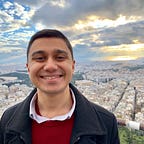Thank you.
Every time I sit down and reflect on my experience in Israel and the West Bank over spring break, I feel a sense of gratitude and privilege to the Trek leaders who selected me to participate; to my friends who were on this journey with me; and to the speakers who gave me a crash course in Israeli and Palestinian life, culture, politics, entrepreneurship, and lived experience.
When we conducted our final pod reflection on a beach in Tel Aviv, my friends eloquently shared their thoughts on everything we had seen and experienced over the week, and I was trying to piece together some inadequate conceptual vs. experiential framework to encapsulate my thoughts and experiences. When I think back on that exercise, what I really remember about the trip are conversations I had with the incredible people I met and the sights and sounds that left an indelible mark, which were collectively an incredible heuristic for opening my eyes to this region of the world.
In Jerusalem, I remember feeling awe-struck standing on the roof of Aish HaTorah overlooking the Western Wall and simultaneously listening to Christian church bells, a Muslim call to prayer, and the wails of Jews praying at the Wall. In Bethlehem, I remember listening to a shop keeper tell me about how her life changed when the Wall of Separation was built on the road between her home and her brother’s home. In Kinneret, I remember wading into the Sea of Galilee and beholding the stillness of the water and the ethereal haze. In Tel Aviv, I remember the open and honest discussion we had with an IDF commander on his purview during active operations. I’ll also never forget the crowds of people out at night celebrating Purim — I’ve never seen anything like it.
And through it all, Trek was an unparalleled opportunity to take a step back from papers and problem sets and connect with an incredible group of students. There’s something magical about putting a group of 50 Harvard students together to ask questions and learn from each other while removing our daily constraints of scheduling meetings, going to office hours, and studying for exams.
Ultimately, what resonated with me the most on Trek was the levels of complexity to many major aspects of Israeli and Palestinian life. It seemed as though every time I felt I had wrapped my head around one aspect of the Israeli-Palestinian conflict, for example, I’d be introduced to five or six new issues and levels to the conflict. Every time I thought I had begun to understand the ethnic diversity of Israel and how that translates to a diversity of lived experiences, my eyes would be opened to cultures of another group. It was fascinating to visit the Nabi Shuʿayb and learn about the Druze community in Israel, for example.
And it’s okay that in a sense I left Trek with more questions than answers, because I’m so grateful to have had the chance to learn more about these nuances so that I can continue the conversation.
Thank you.
